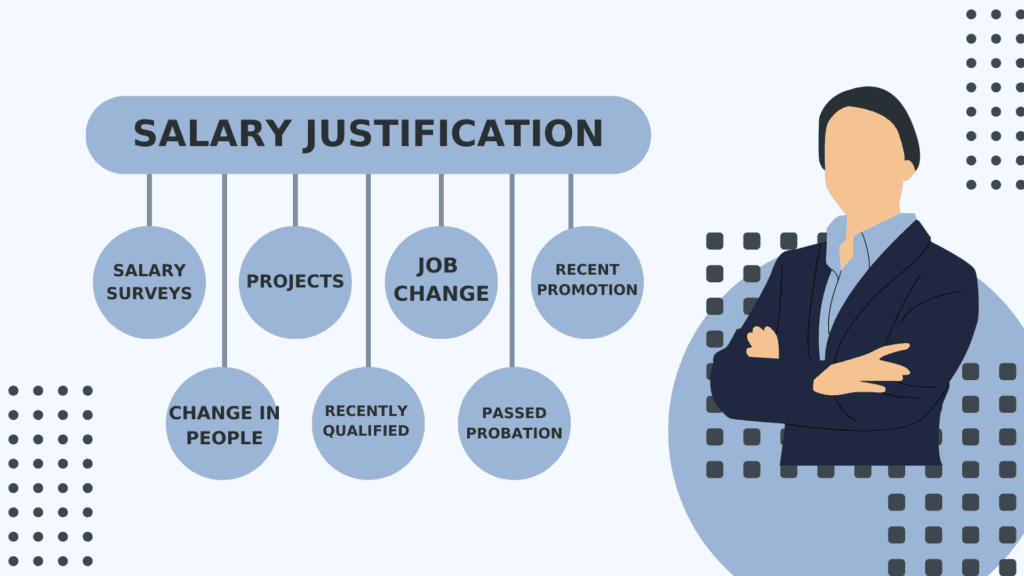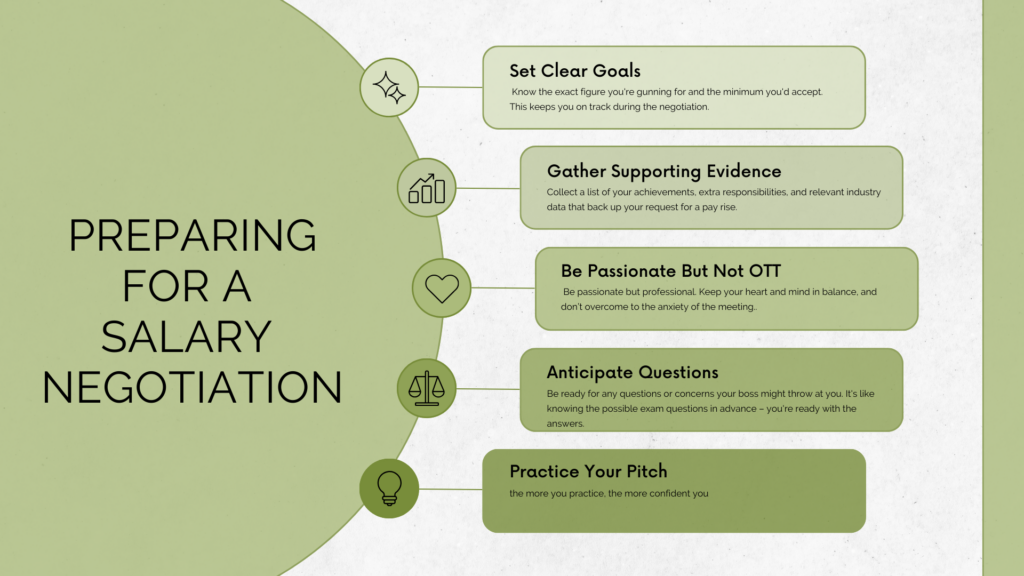Introduction
With 2025 around the corner, many workers are thinking about our future goals and also finances, and it’s estimated that around 10-20% of Australian workers will be seeking a pay rise (of sorts).
Through this guide, we hope to give you the confidence you will need so that you can ask for that all-important pay rise or navigate a counter offer. For some, I know that talking about money with your boss can be awkward, but when it comes to your hard-earned cash, it’s important to step up.
So, let’s explore some of the strategies and tools that you will need.

1) When Is the Right Time to Ask for a Pay Rise?
When you’re thinking about asking for a pay rise, I believe timing is key (and procrastination your worst) enemy. Our survey of the best resume writers in Australia have given a quick summary of the ideal moments that you may want to consider.
Annually or During Performance Reviews: Many companies have that annual performance review tradition, and it’s a great time to chat about your salary. But don’t wait for the next scheduled one if you believe you deserve more – request a mid-year review if needed.
After a Significant Achievement: Did you recently score a big deal, ace a project, or outperform your targets? Chances are, you are being notices. So this is your golden moment to request a pay rise, especially while your achievements are still fresh in everyone’s memory.
When You’ve Taken on More Responsibilities: If you’ve shouldered extra duties, especially outside your job description, it’s a solid reason to ask for a pay increase. It’s like saying, “I’m already doing more, can my pay check reflect that?”
Company’s Financial Health: Is your company rolling in profits and positive announcements, then I’d recommend jumping on the positive sentiment, so keep an eye on the financial health, and when your company or department is doing well, it’s a good time to ask. After all, it’s easier to share the pie when it’s a big one.

2) Finding Out Your Salary Worth Through Salary Surveys
Before you roll up to your boss’s office,I’d recommend that you know your market value. I’m asked the question “how do I know what I should be paid” many times, and here’s how to do it:
Online Salary Surveys: There’s a treasure trove of websites and tools offering salary surveys and calculators. Thankfully, I’ve done the hard work for you. Check out our article on the Top 7 Free Australian Salary Surveys:
Talk to Peers: Did you know that networking with colleagues in your industry can be a game-changer. Discuss salaries discreetly, and you’ll get the inside scoop on what others in similar positions are earning. It’s a real eye opener.
Consult an HR Professional: Do you have any colleagues in HR or Recruitment. They can often provide more definitive data on salary ranges for your position within the company. Just ask and you shall receive.
Take into Account Location: Keep in mind that salaries can vary a lot depending on where you live. The cost of living and local demand for your skills can significantly affect your salary expectations.

The Hays Salary Survey offers a fantastic at a glance review of salaries.
3) How to Prepare for a Salary Negotiation
Getting ready for a salary negotiation is like preparing for a competition. The more you research and practice, the better you will perform.
Set clear goals: Knowing the exact salary figure you’re gunning for and the minimum you’d accept can make a huge difference in the negotiations.
Gather supporting evidence: Collect a list of your achievements, extra responsibilities, and relevant industry data that back up your request for a pay rise. This will give you much more confidence. Importantly, write this information down and take this into the meeting with you. You’ll feel so much more confident.
Practice your pitch: To help build your confidence further, rehearse what you’re going to say. Look in the mirror or have a friend play the boss; the more you practice, the more confident you’ll get. And as mentioned before, take some notes on the meeting with you. It’s a great strategy for staying on track.
Anticipate questions: Be ready for any questions or concerns your boss might throw at you. There’s a huge amount of research on this on Google. Also, keep you resume at hand to remind you of how much you have to offer.
4) How to Negotiate a Salary Range
While negotiating your salary is not a set-and-forget procedure, it’s an art. So here’s some ideas I’ve put together on how to go about it:
Start Higher: If you have a figure in place, then request for just slightly more than that. This leaves room for bargaining and you may arrive near your goal.
Be Open to Benefits: The possibility of other perks, such as additional vacation days or flexible working hours, could be considered if your boss cannot meet the salary requirement. It is not all about the cash but work and life balance.
Emphasise Your Value: Highlight your value at all points in the conversation. Specify what your contributions have achieved. It’s like saying to them, “This is what I did, and it has worked out really well for both of us.”.

5) Tips for Navigating Through the Salary Process
Negotiations can be a bit challenging to navigate, especially if they aren’t something you are used to doing.
Some quick tips are:
Stay calm and professional. Keep your emotions in check and remain professional and in control. Don’t let yourself ramble, and keep focused on the conversation at hand.
Listen actively: Listen carefully to what the other party is saying. By understanding their perspective, you can address their concerns and negotiate.
Don’t rush: Roland Coombes, our Chief Resume Writer explains, do not rush when analysing an offer, and don’t jump into making a counteroffer (you may regret it). Instead, ask for time to consider the conversation that you have had.
6) What to Say When Asking for That Pay Rise
Talking points for requesting that raise.
Open with Gratitude: Begin by thanking the employer for their time and talk about how much you have enjoyed your current role and how much joy it brings to your work. It is as if saying, “I am glad to be part of this team.”
State your request clearly: State clearly what you expect in terms of a salary increase, based on your findings. It is as if one says, “I have completed my homework, and here’s what I require.”
Highlight your achievements: Showcase your contributions and successes. Describe their positive influence on the company. It’s like saying to them, “This is what I have achieved, and it has certainly worked out for the both of us.”
Discuss future value: Describe how the pay raise will encourage you to be even better in future. It is as if to say, “This increase in my salary means that I will do even better work for the company.
7) How to Get a Promotion and a Pay Rise
If you’re thinking big and want a promotion along with a pay rise, consider these steps:
Set Clear Career Goals: Specify what your final career objectives are and discuss them with the manager. They can guide you towards that promotion.
Seek More Responsibilities: However, on the one hand, demonstrate that you have earned a promotion by performing secondary and superb duties in your current role. Take the bull by its horns and say, “I can take on more.”
Invest in Professional Development: Look into further education, training, or accreditations to make yourself a more deserving candidate for promotion with a resume that will get you noticed. It is like upgrading your abilities.

8) What to Do If Your Boss Says No to a Pay Rise
Sometimes, the answer is “no”. But it does not have to be a disaster – just an obstacle. But don’t take the negative, Here’s some tips I’ve put together on what you can do:
Seek Feedback: Question your manager for specific information on why you did not get what you asked. This is like saying, “Tell me how I can improve.”
Request a Follow-Up: Inquire about a future follow-up conversation. It demonstrates your desire to grow. It’s like saying, ‘I don’t surrender.’
Continue to Excel: Go on working hard and recording your successes However, your stubbornness demonstrates that you are committed and may one day result in a significant increase. It’s as though one says, “I’m here to stay.”
In conclusion…
Requesting an increment in your pay is a big step towards building a better career and financial situation. Proper preparation, as well as a carefully planned negotiation strategy and some patience, will help you improve your chances of being granted the compensation increase that you deserve.
It is simply about recognising the amount of effort you have dedicated to this task. Hence, use these tricks and watch your bank balance grow with confidence as you become satisfied with your career.
However, I am available for your assistance. Having your resume in order can also be a life changer. If you want to know what’s better for your career, a resume vs linkedin profile, I can help.
Good luck in trying to attain that well-earned salary increase!
Frequently Asked Questions (FAQs)
1. When is the right time to ask for a pay rise?
Timing is crucial. Consider requesting a pay rise during annual performance reviews, after significant achievements, or when you've taken on extra responsibilities. It's also a good idea to monitor your company's financial health.
2. How can I determine my salary worth?
You can determine your salary worth by using online salary surveys, talking to peers in your industry, consulting your HR department for internal data, and considering the cost of living in your location.
3. How should I prepare for a salary negotiation?
Preparation involves setting clear goals for your desired salary, gathering evidence of your achievements and contributions, practicing your negotiation pitch, and anticipating questions and concerns your boss might raise.
4. What's the best way to negotiate a salary range?
Start by asking for a slightly higher figure than your target to allow room for negotiation. Be open to discussing benefits if the salary isn't flexible, and emphasize your value to the company throughout the negotiation.
5. What tips can help me navigate the salary negotiation process successfully?
Staying calm and professional, active listening to your employer's perspective, and avoiding rushing into decisions are key tips for navigating the salary negotiation process effectively.
6. What should I say when asking for a pay rise?
Start by expressing gratitude for your current role, state your salary request clearly, highlight your achievements, and discuss how the pay rise will motivate you to contribute even more to the company's success.















